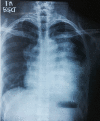Worsening cardiac tamponade after pericardiocentesis in a patient with anterior mediastinum mass: a case report
- PMID: 36004046
- PMCID: PMC9395134
- DOI: 10.1093/ehjcr/ytac329
Worsening cardiac tamponade after pericardiocentesis in a patient with anterior mediastinum mass: a case report
Abstract
Background: Mediastinal mass is an entity with variable pathology and clinical spectrum. Anterior mediastinal mass can result in severe symptoms due to involvement of surrounding vital structures such as the great vessels, trachea-bronchial tree, and heart. We highlight a case of cardiac tamponade in a patient with an anterior mediastinal mass that was paradoxically worsened after decompressive pericardiocentesis.
Case summary: A 21-year-old male presented to the emergency department (ED) with breathlessness and hypotension. Bedside focused cardiac ultrasound revealed cardiac tamponade which was made worse with an anterior mediastinal mass compressing the right heart chambers. The patient was intubated for respiratory failure, following which an ultrasound-guided pericardiocentesis was performed. Unexpectedly, his hemodynamic status worsened after aspiration of 1000 mL of pericardial fluid. A repeat focused cardiac ultrasound showed reduced pericardial effusion, but worsening of right heart chambers compression by the mediastinal mass. Re-expansion of the pericardium space with 600 mL of normal saline improved the patient's vital signs, and reduced the right heart compression. Computed tomography was deferred due to the patient's hemodynamic instability. Despite resuscitation with fluids and initiation of vasopressor, the patient's condition deteriorated. He succumbed to his illness due to obstructive shock causing multi-organ failure. The autopsy showed a large anterior mediastinal mass, and histopathological examination confirmed the diagnosis of lymphoma.
Discussion: This case demonstrated the therapeutic challenges of managing a shock patient with anterior mediastinal mass, and massive pericardial effusion causing cardiac tamponade.
Keywords: Anterior mediastinal mass; Cardiac tamponade; Case report; Pericardiocentesis.
© The Author(s) 2022. Published by Oxford University Press on behalf of the European Society of Cardiology.
Conflict of interest statement
Conflict of interest: None declared.
Figures



Similar articles
-
Mediastinal effusion due to pericardiocentesis with cardiac tamponade: a case report.BMC Anesthesiol. 2021 Jun 16;21(1):172. doi: 10.1186/s12871-021-01385-8. BMC Anesthesiol. 2021. PMID: 34134618 Free PMC article.
-
A case report on ultrasound-guided pericardiocentesis with a right parasternal approach: a novel in-plane lateral-to-medial technique.Int J Emerg Med. 2024 Feb 1;17(1):15. doi: 10.1186/s12245-024-00592-7. Int J Emerg Med. 2024. PMID: 38302868 Free PMC article.
-
A case of cardiac tamponade with a "small" pericardial effusion and superior vena cava syndrome.J Pediatr Intensive Care. 2013 Jun;2(2):71-75. doi: 10.3233/PIC-13052. J Pediatr Intensive Care. 2013. PMID: 31214426 Free PMC article.
-
Pericardial tamponade: A comprehensive emergency medicine and echocardiography review.Am J Emerg Med. 2022 Aug;58:159-174. doi: 10.1016/j.ajem.2022.05.001. Epub 2022 May 6. Am J Emerg Med. 2022. PMID: 35696801 Review.
-
Update on bedside ultrasound diagnosis of pericardial effusion.Intern Emerg Med. 2016 Apr;11(3):477-80. doi: 10.1007/s11739-015-1372-8. Epub 2016 Jan 8. Intern Emerg Med. 2016. PMID: 26746413 Review.
Cited by
-
Anterior Mediastinal Mass and Pericardial Effusion With Right Ventricular Outflow Tract Obstruction Secondary to Dual Compression.JACC Case Rep. 2025 Aug 20;30(24):104405. doi: 10.1016/j.jaccas.2025.104405. Epub 2025 Jun 21. JACC Case Rep. 2025. PMID: 40542799 Free PMC article.
-
Case Report: A crushing sensation-a rare case of mediastinal germ cell tumor causing cardiac tamponade.Front Cardiovasc Med. 2025 Jan 20;11:1539900. doi: 10.3389/fcvm.2024.1539900. eCollection 2024. Front Cardiovasc Med. 2025. PMID: 39902085 Free PMC article.
-
Iatrogenic Causes of Cardiac Tamponade Resulting From Surgical Procedures: An Overview.Cureus. 2023 Jan 14;15(1):e33773. doi: 10.7759/cureus.33773. eCollection 2023 Jan. Cureus. 2023. PMID: 36655159 Free PMC article. Review.
References
-
- Alerhand S, Adrian RJ, Long B, Avila J. Pericardial tamponade: a comprehensive emergency medicine and echocardiography review. Am J Emerg Med 2022;58:159–174. - PubMed
-
- De Carlini CC, Maggiolini S. Pericardiocentesis in cardiac tamponade: indications and practical aspects. Eur Heart J 2017;15.
-
- Erdös G, Tzanova I. Perioperative anaesthetic management of mediastinal mass in adults. Eur J Anaesthesiol 2009;26:627–632. - PubMed
Publication types
LinkOut - more resources
Full Text Sources
